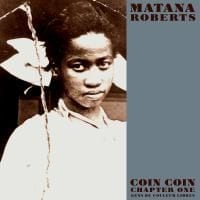
This album by New York-based alto saxophonist Matana Roberts is the first of a projected series, entitled COIN COIN, dealing with issues of history, memory, identity, conflict and freedom as lived by generations of African Americans. Roberts recorded the first “chapter” live in Montreal’s Hotel2Tango studio with a large cast of musicians. The 90-minute concert has been edited down to an hour’s worth of visceral, engaging material, a mixture of poetry, free jazz, and folk forms that recall the revolutionary spirit of the 1960s. Ancestry is clearly important to Roberts and a list of musical precursors would have to include the civil rights music of Max Roach and Abbey Lincoln, the free blowing of Coltrane, Sanders, and Shepp, and the ritual music theater of Art Ensemble of Chicago (like the Ensemble, the Chicago-born Roberts is a member of the Association for the Advancement of Creative Musicians).
In the way the album moves between musical styles and in Roberts’s lyrical themes, COIN COIN gives eloquent voice to the fractured nature of identity, the way conflicting identifications jostle for prominence in our psyches, the multiple consciousness of modern hybridity. This is emphasized in the competing voices speaking over each other in “Kersaia” and in that track’s evolution from poem to a swirling carnival of brass and rhythm. Identity of a more essentialist, brutally physical kind is essayed on “Libation for Mr Brown: Bid Em In”, which recalls the work of Lincoln and Roach on the albums We Insist! Freedom Now and Straight Ahead (Roberts’s screams on “I Am” also conjure memories of Lincoln delivering the “Protest” section of the Freedom Now suite). But again the performance itself is hybrid and playfully subversive, alternating between Brechtian reconstruction of a slave auction and cabaret singalong.
Roberts’s radical approach to jazz styles, her instrumental virtuosity, and her fascination with identity and multiple consciousness recalls Nina Simone, especially Simone’s changing improvisations around her classic song “Four Women”. Another point of reference might be “Kaddish”, Allen Ginsberg’s free verse eulogy to his mother and to madness. Roberts declares that the entire work is for her mother and explicitly dedicates the closing “How Much Would You Cost?” to her. History, trauma, identity, and (r)evolution: these are major themes for an artist to take on. However, it’s clear that not only is Roberts more than capable of doing them justice, but also that COIN COIN is only hinting at what else she has in store. It’s a work that looks back to radical ancestors while also asserting its place in the world of contemporary noise/improv, a link in the chain and a statement of artistic intent.
